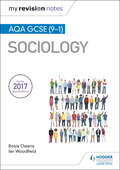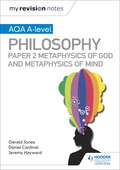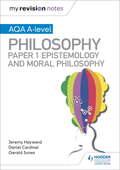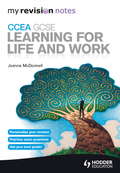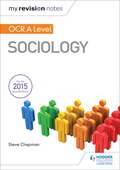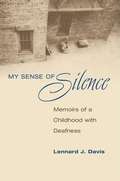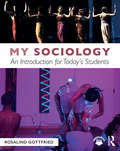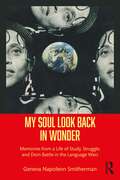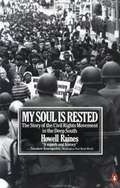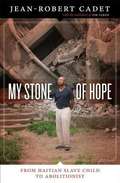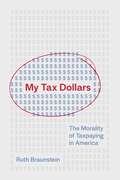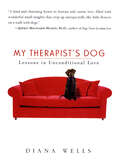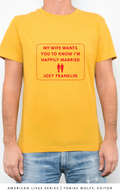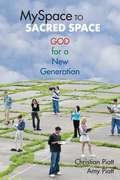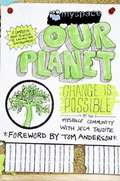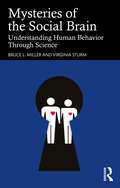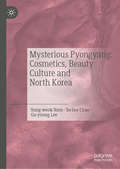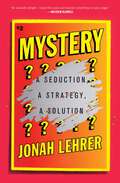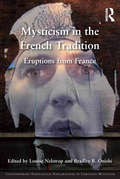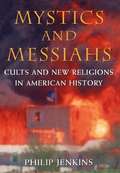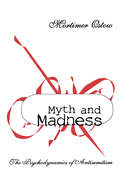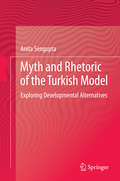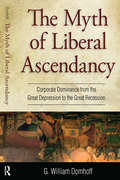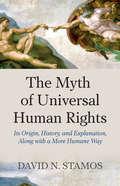- Table View
- List View
My Revision Notes: AQA GCSE (9-1) Sociology
by Ian Woodfield Rosie OwensExam board: AQALevel: GCSESubject: SociologyFirst teaching: September 2017First exams: Summer 2019Target success in AQA GCSE Sociology with this proven formula for effective, structured revision. Key content coverage is combined with exam-style tasks and practical tips to create a revision guide that students can rely on to review, strengthen and test their knowledge.With My Revision Notes, every student can:- Plan and manage a successful revision programme using the topic-by-topic planner- Consolidate subject knowledge by working through clear and focused content coverage- Test understanding and identify areas for improvement with regular 'Now Test Yourself' tasks and answers- Enhance exam responses using relevant case studies for each topic- Improve exam technique through practice questions, expert tips and examples of typical mistakes to avoid
My Revision Notes: Aqa A-level Philosophy Paper 2 Metaphysics Of God Mind Epub (My Revision Notes Ser.)
by Dan Cardinal Jeremy Hayward Gerald JonesTarget success in AQA A-level Philosophy with this proven formula for effective, structured revision; key content coverage is combined with exam-style tasks and practical tips to create a revision guide that you can rely on to review, strengthen and test students' knowledge.With My Revision Notes, every student can:- Plan and manage a successful revision programme using the topic-by-topic planner- Consolidate subject knowledge by working through clear and focused content coverage- Test understanding and identify areas for improvement with regular 'Now Test Yourself' tasks and answers- Improve exam technique through practice questions, expert tips and examples of typical mistakes to avoid
My Revision Notes: Aqa A-level Philosophy Paper1 Epist And Moral Epub
by Dan Cardinal Jeremy Hayward Gerald JonesTarget success in AQA A-level Philosophy with this proven formula for effective, structured revision; key content coverage is combined with exam-style tasks and practical tips to create a revision guide that you can rely on to review, strengthen and test students' knowledge.With My Revision Notes, every student can:- Plan and manage a successful revision programme using the topic-by-topic planner- Consolidate subject knowledge by working through clear and focused content coverage- Test understanding and identify areas for improvement with regular 'Now Test Yourself' tasks and answers- Improve exam technique through practice questions, expert tips and examples of typical mistakes to avoid
My Revision Notes: CCEA GCSE Learning for Life and Work
by Joanne McDonnellWritten by a senior examiner and teacher, this revision guide has been designed to thoroughly prepare students for the CCEA Learning for Life and Work examination. It includes: summaries of the main content (Local and Global Citizenship; Personal Development; Employability); activities to test knowledge and understanding; sample exam questions with model answers online, showing examples of what students are expected to write to succeed in their examination.
My Revision Notes: OCR A Level Sociology
by Steve ChapmanManage your own revision with step-by-step support from experienced teacher and examiner Steve Chapman. Use a selection of examples activities to improve your understanding of sociological concepts. Apply sociological terms accurately with the help of definitions and key words.- Plan and pace your revision with the revision planner- Use the expert tips to clarify key points- Avoid making typical mistakes with expert advice- Test yourself with end-of-topic questions and answers and tick off each topic as you complete it- Get exam ready with last minute quick quizzes at www.hodderplus.co.uk/myrevisionnotes
My Revision Notes: OCR A Level Sociology
by Steve ChapmanManage your own revision with step-by-step support from experienced teacher and examiner Steve Chapman. Use a selection of examples activities to improve your understanding of sociological concepts. Apply sociological terms accurately with the help of definitions and key words.- Plan and pace your revision with the revision planner- Use the expert tips to clarify key points- Avoid making typical mistakes with expert advice- Test yourself with end-of-topic questions and answers and tick off each topic as you complete it- Get exam ready with last minute quick quizzes at www.hodderplus.co.uk/myrevisionnotes
My Sense of Silence: Memoirs of a Childhood with Deafness
by Lennard J. DavisLennard J. Davis grew up as the hearing child of deaf parents. In this candid, affecting, and often funny memoir, he recalls the joys and confusions of this special world, especially his complex and sometimes difficult relationships with his working-class Jewish immigrant parents. Gracefully slipping through memory, regret, longing, and redemption, My Sense of Silence is an eloquent remembrance of human ties and human failings.
My Sociology: An Introduction for Today's Students
by Rosalind GottfriedMy Sociology reconceptualizes intro sociology for the changing demographics in today’s higher education environment. Concise and student-focused, My Sociology captures students' attention with engaging stories and a focus on non-dominant populations. Rather than introducing students to theory and history at the beginning of the text, the book integrates the necessary information throughout to keep students engaged.
My Soul Look Back in Wonder: Memories from a Life of Study, Struggle, and Doin Battle in the Language Wars
by Geneva Napoleon SmithermanThis is the story of Dr. Geneva Smitherman, aka "Dr. G," the pioneering linguist often referred to as the "Queen of Black Language." In a series of narrative essays, Dr. G writes eloquently and powerfully about the role of language in social transformation and the academic, intellectual, linguistic, and societal debates that shaped her groundbreaking work as a Black Studies O.G. and a Womanist scholar-activist of African American Language. These eleven essays narrate the development of Dr. G’s race, gender, class, and linguistic consciousness as a member of the Black Power Generation of the 1960s and 70s. In My Soul Look Back In Wonder, Dr. G links the personal to the professional and the political, situating the struggles, and successes, of a Black woman in the Academy within the historical experiences and development of her people. As Dr. G enters her eighth decade, in this Black Lives Matter historical moment, she seeks to share the meaning and purpose of a life of study and struggle and its significance for all those who seek racial and social justice today.
My Soul is Rested: Movement Days in the Deep South Remembered
by Howell RainesThe almost unfathomable courage and the undying faith that propelled the Civil Rights Movement are brilliantly captured in these moving personal recollections. Here are the voices of leaders and followers, of ordinary people who became extraordinary in the face of turmoil and violence. From the Montgomery Bus Boycott in 1956 to the death of Martin Luther King, Jr. , in 1968, these are the peeople who fought the epic battle: Rosa Parks, Andrew Young, Ralph Abernathy, Hosea Williams, Fannie Lou Hamer, and others, both black and white, who participated in sit-ins, Freedom Rides, voter drives, and campaigns for school and university integration. Here, too, are voices from the "Down-Home Resistance" that supported George Wallace, Bull Connor, and the "traditions" of the Old South--voices that conjure up the frightening terrain on which the battle was fought. My Soul is Rested is a powerful document of social and political history, as well as a magnificent tribute to those who made history happen.
My Stone of Hope
by Jean-Robert CadetThere are 27 million slaves living in the world today—more than at any time in history. Three hundred thousand of them are impoverished children in Haiti, who “stay with” families as unpaid and uneducated domestic workers, subject to physical, emotional, and sexual abuse. This practice, known locally as restavek (“staying with”), is so widespread that one in ten Haitian children is caught up in this form of slavery. Jean-Robert Cadet was a restavek in Haiti from the late 1950s until the early 1970s. He told the harrowing story of his youth in Restavec: From Haitian Slave Child to Middle-Class American—a landmark book that exposed ongoing child slavery in Haiti. Now in My Stone of Hope, Cadet continues his story from his early attempts to adjust to freedom in American society to his current life mission of eliminating child slavery through advocacy and education. As he recounts his own struggles to surmount the psychological wounds of slavery, Cadet puts a human face on the suffering that hundreds of thousands of Haitians still endure daily. He also builds a convincing case that child slavery is not just one among many problems that Haiti faces as the Western Hemisphere’s poorest nation. Rather, he argues that the systematic abuse of so many of its children is Haiti’s fundamental problem, because it creates damaged adults who seem incapable of governing the country justly or managing its economy productively. For everyone concerned about the fate of Haiti, the welfare of children, and the freedom of people around the globe, My Stone of Hope sounds an irresistible call to action.
My Tax Dollars: The Morality of Taxpaying in America
by Ruth BraunsteinWhen the mundane reality of paying taxes takes on moral significanceIn My Tax Dollars, Ruth Braunstein maps the contested moral landscape in which Americans experience and make sense of the tax system. Braunstein tells the stories of Americans who view taxpaying as more than a mundane chore: antigovernment tax defiers who challenge the legitimacy of the tax system, antiwar activists who resist the use of their taxes to fund war, antiabortion activists against &“taxpayer funded abortions,&” and a diverse group of people who promote taxpaying as a moral good.Though taxpaying is often portrayed as dull and technical, exposure to collective rituals, civic education, propaganda, and protest transforms the practice for many Americans into either a sacred rite of citizenship or a profane threat to what they hold dear. These sacred and profane meanings can apply to the act of taxpaying itself or to the specific uses of tax dollars. Despite intense disagreement about these meanings, politically diverse Americans engaged in both taxpaying and tax resistance valorize the individual taxpayer and &“my tax dollars.&”Braunstein explores the profound implications of this meaning making for tax consent, the legitimacy of the tax system, and citizens&’ broader understandings of their political relationships. Going beyond the usual focus on tax policy, Braunstein&’s innovative view of taxation through the lens of cultural sociology shows how citizens in value-diverse societies coalesce around shared visions of the sacred and fears of the profane.
My Therapist's Dog: Lessons in Unconditional Love
by Diana WellsDiana Wells's intriguing exploration into the rewards of relationships--both the canine and human varieties--begins when she reluctantly starts seeing a psychologist, Beth, during a difficult time in her life. With no insurance to pay for counseling, a barter is arranged in which the client becomes part-time caretaker to the therapist's dog, Luggs, a sweet, clumsy black Labrador retriever. As Wells examines her past--her peripatetic childhood, her eccentric family, her grief over the deaths of loved ones--Luggs provides a bridge between therapist and patient. Dog lover by nature, historian by trade, Wells finds herself curious about the connections that dogs and humans have shared for centuries--and what these bonds tell us about our own psyches. Wells observes that training a dog has much in common with the therapeutic techniques her psychologist employs. Looking into recent experiments that have proved dogs better at interpreting human behavior than chimps or wolves, Wells explores the subtleties of her own relationship with dogs. Increasingly she finds herself agreeing with Diogenes, the original Greek cynic (the word cynic comes from the greek kuon, meaning "dog"), who said that unless we think like dogs, happiness will elude us. Wells analyzes what we name our dogs, how we breed them, how we've explored the wilderness with them, the kinds of literature we write about them, why we love them, and, most important, what we can learn from them. When an unexpected illness befalls Beth, Luggs comforts the two women, and his devotion helps Wells come to accept that relationships--despite the possibility of hurt and pain--are what life is all about.
My Wife Wants You to Know I'm Happily Married (American Lives)
by Joey FranklinModern manhood is confusing and complicated, but Joey Franklin, a thirtysomething father of three, is determined to make the best of it. In My Wife Wants You to Know I’m Happily Married, he offers frank, self-deprecating meditations on everything from male-pattern baldness and the balm of blues harmonica to grand theft auto and the staying power of first kisses. He riffs on cockroaches, hockey, romance novels, Boy Scout hikes, and the challenge of parenting a child through high-stakes Texas T-ball. With honesty and wit, Franklin explores what it takes to raise three boys, succeed in a relationship, and survive as a modern man. My Wife Wants You to Know I’m Happily Married is an uplifting rumination on learning from the past and living for the present, a hopeful take on being a man without being a menace to society. Access free teaching resources.
MySpace to Sacred Space: God for a New Generation
by Christian Piatt Amy PiattRecently, MySpace.com has become one of the most-visited Web sites in the world. With millions of young users, this one site has made a giant impact on youth pop culture in just a matter of a few years. At the same time, themes of spirituality pervade our lives. From television to film and popular literature, theology is a burgeoning enterprise in popular culture. In contrast, most churches and denominations are built on eighteenth-century principles, and are fighting to remain relevant to young members. The collective fear is that if the church doesn't adapt to this new generation, they will be left behind forever. Christian and Amy Piatt believe church leaders have a responsibility to stay tuned in to the values and vernacular employed by the younger generations. MySpace to Sacred Space combines first-hand accounts with case studies from people both within and outside the church. Far from tolling the death knell for the established church, MySpace to Sacred Space is an affirming, hopeful look at the ever-growing need for what the Christian faith can offer the world. Much of the relevance for the twenty-first century church can be found in our oldest traditions. By reconnecting with our past and by setting time aside for God and for one another, we have an opportunity to create sacred space and time wherever we are.
MySpace/OurPlanet: Change Is Possible
by Tom Anderson Dan Santat Jeca Taudte Myspace Community Staff Community MyspaceYou can change the world. Here's how. Our climate is changing and human actions are the cause. Maybe you don't know why, or what to do about it. We do. In fact, we wrote a book about it (this book, the one in your hands). We'll harness your green intentions and push you beyond turning off the AC every once in a while. It's all in here: how to keep the planet healthy facts and info real-life stories suggestions and challenges eco-tips from MySpace users around the globe. Everybody who submitted a tip got their username in this book, btw. Each of us has the power to make a difference-open this book, arm yourself with knowledge, and start now. (Seriously. What are you waiting for?)
Mysteries of the Social Brain: Understanding Human Behavior Through Science
by Bruce L. Miller Virginia SturmMysteries of the Social Brain describes the scientific underpinnings of human behavior and values. Through the retelling of fascinating clinical stories of people with neurological conditions, this book explores the parts of the brain that allow humans to thrive as social and creative beings. The authors reveal the relevance of our brain circuits to our well‑being—and the well‑being of our societies—and show what happens when changes in our brain circuitry drive changes in empathy, altruism, moral beliefs, and creativity.By integrating perspectives from neurology, psychology, psychiatry, and neuroscience, the stories in this book offer novel insights into the inner workings of the social brain and reveal groundbreaking findings from work in frontotemporal dementia, emotion, and the science of human values. This book showcases the novel discovery that creativity can emerge when there is decline in the brain’s language systems, a finding that highlights the robust, yet underappreciated connections between science and art. Readers will learn about the biological basis of social behavior as well as simple steps that they can take to improve the functioning of their own social brains.Miller and Sturm take us on an engaging dive into the field of behavioral neurology and neuroscience, exploring what we can learn from people with neurological conditions, and revealing the ways that neuroscience can change societies for the better. It will captivate general readers as well as clinicians and scientists who are interested in human social behavior, cognition, and emotion.
Mysterious Pyongyang: Cosmetics, Beauty Culture and North Korea
by Nam Sung-wook Chae Su-lan Lee Ga-youngThis book is written with the belief that the peaceful unification of Korean Peninsula will be upon us on the day that every woman in North Korea uses South Korean and global cosmetics. The authors focus on understanding the intentions behind the three leaders of North Korea, Kim Il-sung, Kim Jong-il and Kim Jong-un, based on their comments on the cosmetics industry and their field guidance tendencies, analyzing the governance style of Pyongyang through women’s life and beauty culture. It is the earliest book of its kind in the women’s life and beauty culture of North Korea.
Mystery: A Seduction, A Strategy, A Solution
by Jonah LehrerWhy does mystery create a mental itch that must be scratched? New York Times bestselling author Jonah Lehrer unlocks the secrets of mystery&’s allure, putting together recent discoveries in the fields of psychology, neuroscience, and anthropology and shining a new light on everything from the formulas of our favorite detective shows to the tricks of successful advertising campaigns and the calculated risks of the stock market.Why is mystery so compelling? What draws us to the unknown? Jonah Lehrer sets out to answer these questions in a vividly entertaining and surprisingly profound journey through the science of suspense. He finds that nothing is proven to capture a person&’s attention as strongly as mystery, making mystery the key principle in how humans see and learn to understand the world. Whenever patterns are broken, we are hard-wired to find out why. Without our curiosity driving us to pursue new discoveries and persevere in solving stubborn problems, we would never have achieved the breakthroughs that have revolutionized human medicine, technology—and culture. From Shakespeare&’s plays to the earliest works of the detective genre, our entertainment and media have continually reinvented successful forms of mystery to hook audiences. In Mystery, Lehrer interviews individuals in unconventional fields who use mystery to challenge themselves and to motivate others to reach to new heights, from dedicated small-business owners to innovative schoolteachers. He also examines the indelible role of mystery in our culture, revealing how the magical world of Harry Potter triggers the magic of dopamine in our brains, why the baseball season is ten times longer than the football season, and when the suspect is introduced in each episode of Law & Order. Illuminating and engaging, Mystery explores the many surprising ways in which embracing a sense of awe and curiosity can enrich our lives.
Mysticism in the French Tradition: Eruptions from France (Contemporary Theological Explorations in Mysticism)
by Louise Nelstrop Bradley B. OnishiIn the nineteenth and early twentieth centuries secular French scholars started re-engaging with religious ideas, particularly mystical ones. Mysticism in the French Tradition introduces key philosophical undercurrents and trajectories in French thought that underpin and arise from this engagement, as well as considering earlier French contributions to the development of mysticism. Filling a gap in the literature, the book offers critical reflections on French scholarship in terms of its engagement with its mystical and apophatic dimensions. A multiplicity of factors converge to shape these encounters with mystical theology: feminist, devotional and philosophical treatments as well as literary, historical, and artistic approaches. The essays draw these into conversation. Bringing together an international and interdisciplinary range of contributions from both new and established scholars, this book provides access to the melting pot out of which the mystical tradition in France erupted in the twenty-first century, and from which it continues to challenge theology today.
Mystics and Messiahs: Cults and New Religions in American History
by Philip Jenkins[Book Jackets] "Are religious fringe movements a recent phenomenon in American history? Are widespread fears of mass suicides, sexual abuse, and brainwashing in cults justified? Do marginalized religious groups play any positive role in American spiritual life? Do the panics over such groups follow any discernible pattern? Philip Jenkins gives fascinating--and surprising--answers to these and many other questions in Mystics and Messiahs, the first full account of cults and anti-cult scares in American history. Jenkins shows that, contrary to popular belief, cults were by no means an invention of the 1960s. In fact, most of the frightening images and stereotypes surrounding fringe religious movements are traceable to the mid-nineteenth century when Mormons, Freemasons, and even Catholics were vehemently denounced for supposed ritualistic violence, fraud, and sexual depravity. As Charles Ferguson observed in 1928, "America has always been the sanctuary of amazing cults." But America has also been the home of an often hysterical anti-cult backlash. Jenkins provides an insightful new analysis of why cults arouse such fear and hatred both in the secular world and in mainstream churches, many of which--Baptists, Quakers, Pentecostals, and Methodists--were themselves originally regarded as cults. Most importantly, Jenkins argues that an accurate historical perspective is urgently needed if we are to avoid the kind of catastrophic confrontation that occurred in Waco or the ruinous prosecution of imagined Sattanic cults in the 1980s. While not ignoring genuine instances of aberrant behavior, Mystics and Messiahs goes beyond the vast edifice of myth, distortion, and hype to reveal the true characteristics of religious fringe movements and why they inspire such fierce antagonism."
Myth and Madness: The Psychodynamics of Anti-Semitism
by Mortimer OstowThe persistence of anti-Semitism and its current resurgence after a brief post-Holocaust suppression, challenge those who study human behavior to locate the causal bases of anti-Semitism and find approaches to combat it. This is an astonishing report of a nine-year study of the psychodynamics of anti-Semitism. Undertaken by Dr. Mortimer Ostow on behalf of the Psychoanalytic Research and Development Fund, it puts flesh and bones on the discussion of antisemitism in Sigmund Freud's 1939 classic theoretical study Moses and Monotheism. Its close adherence to case material, and application of psychoanalytic theory to historical data and cultural products, yields new insights into bigotry and equity alike.By examining prejudiced patients and their myths, Dr. Ostow shows the common threads of anti-Semitism in a variety of national and cultural settings, even under supposed optimal conditions when antisemitism is stringently controlled. The work uses the psychiatric approach, and can be read as a study of how this area of behavioral science reveals the interplay of the individual and the group, cultural background and material opportunities.The book is divided into five major segments: Psychoanalytic interpretation of anti-Semitism in the past; clinical data on anti-Semitic sentiments in a variety of personal and national settings; mythological dimensions of anti-Semitism and apocalyptic doctrines; specific anti-Semitic myths including pre-Christian early and medieval Christian, "racial" and post-modern Muslim anti-Semitism. The final segment focuses on the pogrom mentality, including the Nazi phenomenon, antisemitic fundamentalism, and black anti-Semitism.Myth and Madness is informed by an amazing breadth of learning: from biblical exegesis to modern sociology, from close attention to mundane patients to evaluating mythic claims of the loftiest, and at times most dangerous sort. This is a landmark effort—one that will be the touchstone for theoretical and clinical works to come.
Myth and Rhetoric of the Turkish Model
by Anita SenguptaThe volume discusses what the Turkish Model, or Turkish Development Alternative, was and why it was promoted in the Central Asian republics immediately following the dissolution of the Soviet Union. It argues that the Turkish Model was a myth that transferred the ideal of a ''secular, democratic, liberal society'' as a model for the post Soviet Turkic world and in the process encouraged a ''Turkic" rhetoric that emphasized connection between the two regions based on a common ancestry. The volume begins with an understanding of the reality of the Model from a Turkish perspective and then goes on to examine whether the Turkic world as a "cultural-civilizational alternative" makes sense both from a historical as well as contemporary perspective. It concludes by looking at the re-emergence of the Model in the wake of the events in West Asia in early 2011 and examines how in the light of a search for options the Turkish Model is once again projected as viable.
Myth of Liberal Ascendancy: Corporate Dominance from the Great Depression to the Great Recession
by G. Williams DomhoffBased on new archival research, G. Williams Domhoff challenges popular conceptions of the 1930's New Deal. Arguing instead that this period was one of increasing corporate dominance in government affairs, affecting the fate of American workers up to the present day. While FDR's New Deal brought sweeping legislation, the tide turned quickly after 1938. From that year onward nearly every major new economic law passed by Congress showed the mark of corporate dominance. Domhoff accessibly portrays documents of the Committee's vital influence in the halls of government, supported by his interviews with several of its key employees and trustees. Domhoff concludes that in terms of economic influence, liberalism was on a long steady decline, despite two decades of post-war growing equality, and that ironically, it was the successes of the civil rights, feminist, environmental, and gay-lesbian movements-not a new corporate mobilisation-that led to the final defeat of the liberal-labour alliance after 1968.
Myth of Universal Human Rights: Its Origin, History, and Explanation, Along with a More Humane Way
by David N. StamosIn this groundbreaking and provocative new book, philosopher of science David N. Stamos challenges the current conceptions of human rights, and argues that the existence of universal human rights is a modern myth. Using an evolutionary analysis to support his claims, Stamos traces the origin of the myth from the English Levellers of 1640s London to our modern day. Theoretical defenses of the belief in human rights are critically examined, including defenses of nonconsensus concepts. In the final chapter Stamos develops a method of naturalized normative ethics, which he then applies to topics routinely dealt with in terms of human rights. In all of this Stamos hopes to show that there is a better way of dealing with matters of ethics and justice, a way that involves applying the whole of our evolved moral being, rather than only parts of it, and that is fiction-free.
